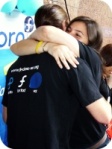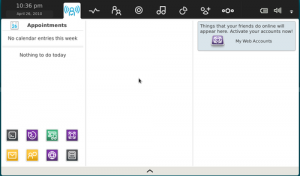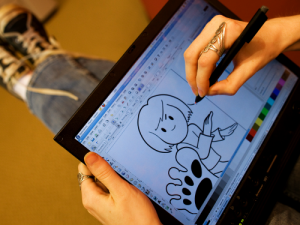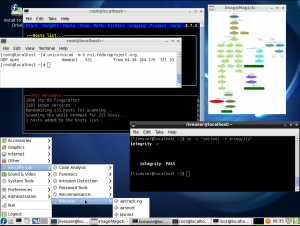Fedora is a Linux-based operating system that brings the latest in free and open source software to your desktop, laptop and server, and gives you access to thousands of different open source applications. This helpful, user-friendly operating system is built by people across the globe who work together as a community, to create the the Fedora Project.
 |
 |
 |
 |

|
Fedora is free to use, modify, and distribute, and includes software that helps you work, play, organize, and socialize. You can read more information about the Fedora Project on our Overview page.
File:F13-relnotes-screenshot-main.png
Les nouveautés de Fedora 13
Avec Fedora 13 (Goddard), GNU/Linux n'a jamais été aussi accessible à tout type d'utilisateurs. Voici un aperçu de ce qui vous attends.
Bureau
Impression facile
Vous avez déjà été frustré par les messages d'erreurs de votre nouvelle imprimante qui vous demande d'installer le bon pilote ? Avec la fonctionnalité impression facile de Fedora 13, il suffit de brancher son imprimante et Fedora recherchera automatiquement le bon pilote et vous proposera de l'installer. Cette fonctionnalité ravira les utilisateurs mobiles qui pourront imprimer en quelques minutes n'importe où. C'est une des nombreuses innovations de Fedora 13 vous permettant de profiter de votre matériel.
Gestion des couleurs
La gestion des couleurs permet aux artistes, photographes et graphistes d'afficher et d'imprimer leurs oeuvres avec un rendu fidèle des couleurs en utilisant du logiciel 100% libre. Un rendu fidèle des couleurs pour les écrans, imprimantes et scanners vous permet de travailler dans de bonne conditions. La gestion des couleurs complète le flux opérationnels pour les graphistes, photographes, imprimeurs ou créateurs de tout niveau.
Video Drivers
You want 3D? We've got it, in completely free, accelerated video drivers for ATI, Intel, and now NVidia too. Out of the box you can run a variety of 3D accelerated games, enable cool desktop effects, and even try out the next-generation GNOME Shell. And since these drivers are completely free (as in cost and freedom), we can continue improving them like any other free and open source software so your enjoyment grows over time.
System Administrators
If you spend your day managing how other people around you use Linux, Fedora 13 is loaded with features that will make your life even easier. Whether you want to migrate new users to a Linux environment or experiment with the newest in open-source technologies to give yourself an edge, Fedora has all the tools you need.
For instance, you can download a single, tiny image file from boot.fedoraproject.org, based on the work of boot.kernel.org, and from it run and install current and future versions of Fedora without having to download additional images.
Do you need to log in to your office's domain even though you're on the go with a laptop? Then you'll love the brand-new SSSD (System Security Services Daemon). This new software provides expanded features for logging into managed domains, including caching for offline authentication. So even if you're sitting in a coffeeshop in San Diego, you can still access your office back in New York.
The things you know and love are still here - but better than ever. NFSv4 -- the latest version of NFS -- is now available by default in Fedora 13, bringing you better performance and IPv6 support.
The best part? They're all free and open source software -- just one more thing you can impress the boss with.
Developers
Are you a hacker who loves to play with open source? Are you building the world's next great web application? Then you'll love Fedora's new features for software developers.
SystemTap already gives you plenty of ways to monitor what your system kernel is doing, whether it's reading from the network or writing to a disk. But with new static probes in Fedora 13, SystemTap can look beyond the kernel to let you see what's happening inside your application and language runtimes like Java, Python and TCL.
Did we mention advances in Python? If you love Python like we do, you'll also love Fedora 13's ability to generate dual-language backtraces. Debugging your work when you're mixing Python and C/C++ just got easier in Fedora 13 with this feature, which originates in Fedora and is making its way into the Python language upstream. Fedora 13 also blazes a trail with a parallel-installable Python 3 stack that helps you write and test code for use in both Python 2.6 and Python 3 environments.
And if you're into Java, you'll find version 6.8 of the NetBeans IDE, the first to offer complete support for the entire Java EE 6 spec. It also has improved support for JSF 2.0/Facelets, Java Persistence 2.0, and EJB 3.1.
And of course Fedora's package ecosystem is rich with thousands of other tools for many languages and development styles. After all, we use it for development ourselves.
Spins
Spins are more specialized versions of Fedora that allow you to run programs that suit your interests. For example:
Looking for something else?
Find more spins at http://spins.fedoraproject.org/ -- there's a spin for everyone, from education and gaming to science and more!
How to get started
Intrigued? Want to give Fedora 13 a try?
You can visit http://fedoraproject.org/get-fedora to download a LiveCD, regardless of what operating system you're running. This will give you a working version of Fedora, complete with common applications, all running off your CD drive - your hard drive won't be touched at all. And when you're ready, installation is just a click away.
Want an even more enjoyable way to use Fedora, risk-free? Try the Live USB option. You can use the same download to create a bootable USB stick so you can take Fedora with you anywhere you go. It works great with netbooks without CD drives, too. Check out the instruction page here:
https://fedoraproject.org/wiki/How_to_create_and_use_Live_USB
And if you're running Fedora 12, upgrading is easy. Refer to our handy documentation for help.
Help make Fedora!
 |
Want to join the Fedora community and help us make the best Linux distribution even better? Get started at http://fedoraproject.org/wiki/Join. Our diverse community from all over the globe welcomes contributors of all types. From artists to marketers to coders to testers to writers to translators and more, you too can get involved. Share what you know or help with something you've always wanted to learn; mentors are always available to help you get started. Any help is appreciated!
We'd love to hear your thoughts on Fedora 13. Have a suggestion? Find a bug? Start by taking a look at the Common F13 bugs to see if it's something we know about. (That page has information on what to do if you don't find your bug, too.) |
Further reading
Want more? Here are some further resources on Fedora 13, or talk with a community member in our live chat 24/7.
- Fedora 13 release announcement (http://fedoraproject.org/wiki/Fedora_13_Announcement)
- Fedora Overview (http://fedoraproject.org/wiki/Overview)
- Fedora FAQ (http://fedoraproject.org/wiki/FAQ)
- Help and Discussions (http://fedoraproject.org/wiki/Communicate)
- Fedora 13 release notes (http://docs.fedoraproject.org/release-notes/)
- Fedora 13 feature profiles (http://fedoraproject.org/wiki/F13_feature_profiles)
- Fedora 13 talking points (http://fedoraproject.org/wiki/Fedora_13_Talking_Points)
- Common Fedora 13 Bugs (http://fedoraproject.org/wiki/Common_F13_bugs)
About this document
- LINK TO PDF/SVG versions
- Translations of this document are also available - if you make a translation, please link to it from this list!
- TRANSLATION
- TRANSLATION TO SPANISH: http://proyectofedora.org/wiki/Conoce_Fedora_13





